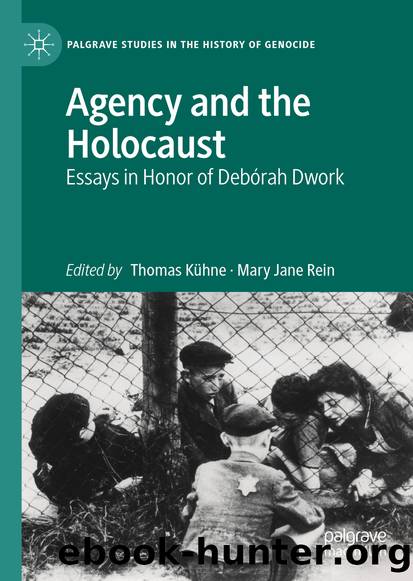Agency and the Holocaust by Unknown

Author:Unknown
Language: eng
Format: epub
ISBN: 9783030389987
Publisher: Springer International Publishing
Eva Reichmann and the Salvage of Memory
The Library compiled one of the largest collections of survivor accounts and shaped the emerging academic study of the Holocaust and its contextual history. As the JCIO, it had already collected more than 350 eyewitness reports immediately after the November Pogrom, which set methodological precedents for later projects.11 Coinciding with the employment of new staff members, particularly Eva Reichmann (née Jungmann), the Library published a series of testimonies in 1945 and 1946, titled Jewish Survivors Report: Documents of Nazi Guilt. Reichmann, who came to direct the 1950s eyewitness reports project, had trained as a sociologist and historian in Breslau, Berlin, Munich and Heidelberg. Like Wiener, she had worked for the CV before fleeing to London in 1939 with her husband, the jurist Hans Reichmann, who was released from Sachsenhausen in that year after being incarcerated in 1938.12 Her mother, Agnes Jungmann, deported to the Terezín (Theresienstadt) ghetto in September 1942, did not survive. Reichmann returned to intellectual pursuits in London, completing another doctorate at the London School of Economics on “The Social Sources of National Socialist Anti-Semitism” (published in 1950 as Hostages of Civilisation), with support from the American Jewish Committee.13 Hostages of Civilisation was among the first studies about antecedents to the Holocaust published after the war, examining multiple causal factors that led to the destruction of European Jewry. It provided a critical treatment of the debate on the alleged failure of Jewish emancipation and its relationship to the Holocaust.14 Reichmann worked for the BBC’s German Service before joining the Library in 1945 as Director of Research, where she remained until 1959. In her obituary, the late Arnold Paucker, director of the Leo Baeck Institute (which Reichmann also helped found), called her “one of the greatest German Jewish women of this century.” Indeed, she became extensively involved in the German Jewish refugee community in England during the war and, like Wiener, an advocate for reconciliation with Germany after the war.
In exile Reichmann maintained a significant intellectual link to German scholarship. She extended her antisemitism research through her doctoral project at the LSE and later in her work for the Library.15 The Library’s eyewitness accounts project was launched at a time when other similar efforts were drawing to a close.16 Why then did the Library initiate the project at this time? The rationalisation was linked to the Library’s wider collections strategy shaped by a newly refined institutional mandate described by Reichmann in AJR Information in November 1954:Our demand that justice be done to all individual criminals involved in the misdeeds we suffered is by far the weakest motive prompting our call for the preservation of our collective experience. Considerably stronger is our thankfulness for our own salvation, undeserved though it must seem to us, whenever we view it against the background of the immeasurable tragedy of our people. The strongest motive, however, is our perennial wish that the memory of our dead should be enshrined in a dignified account of their achievements and of
Download
This site does not store any files on its server. We only index and link to content provided by other sites. Please contact the content providers to delete copyright contents if any and email us, we'll remove relevant links or contents immediately.
Fanny Burney by Claire Harman(25778)
Empire of the Sikhs by Patwant Singh(22163)
Out of India by Michael Foss(16309)
Leonardo da Vinci by Walter Isaacson(11896)
Small Great Things by Jodi Picoult(6086)
The Six Wives Of Henry VIII (WOMEN IN HISTORY) by Fraser Antonia(4784)
The Wind in My Hair by Masih Alinejad(4420)
The Lonely City by Olivia Laing(4112)
The Crown by Robert Lacey(4099)
A Higher Loyalty: Truth, Lies, and Leadership by James Comey(4025)
The Iron Duke by The Iron Duke(3636)
Millionaire: The Philanderer, Gambler, and Duelist Who Invented Modern Finance by Janet Gleeson(3565)
Sticky Fingers by Joe Hagan(3449)
Alive: The Story of the Andes Survivors by Piers Paul Read(3303)
Papillon (English) by Henri Charrière(3264)
Joan of Arc by Mary Gordon(3253)
Stalin by Stephen Kotkin(3081)
Aleister Crowley: The Biography by Tobias Churton(3015)
Ants Among Elephants by Sujatha Gidla(2920)
